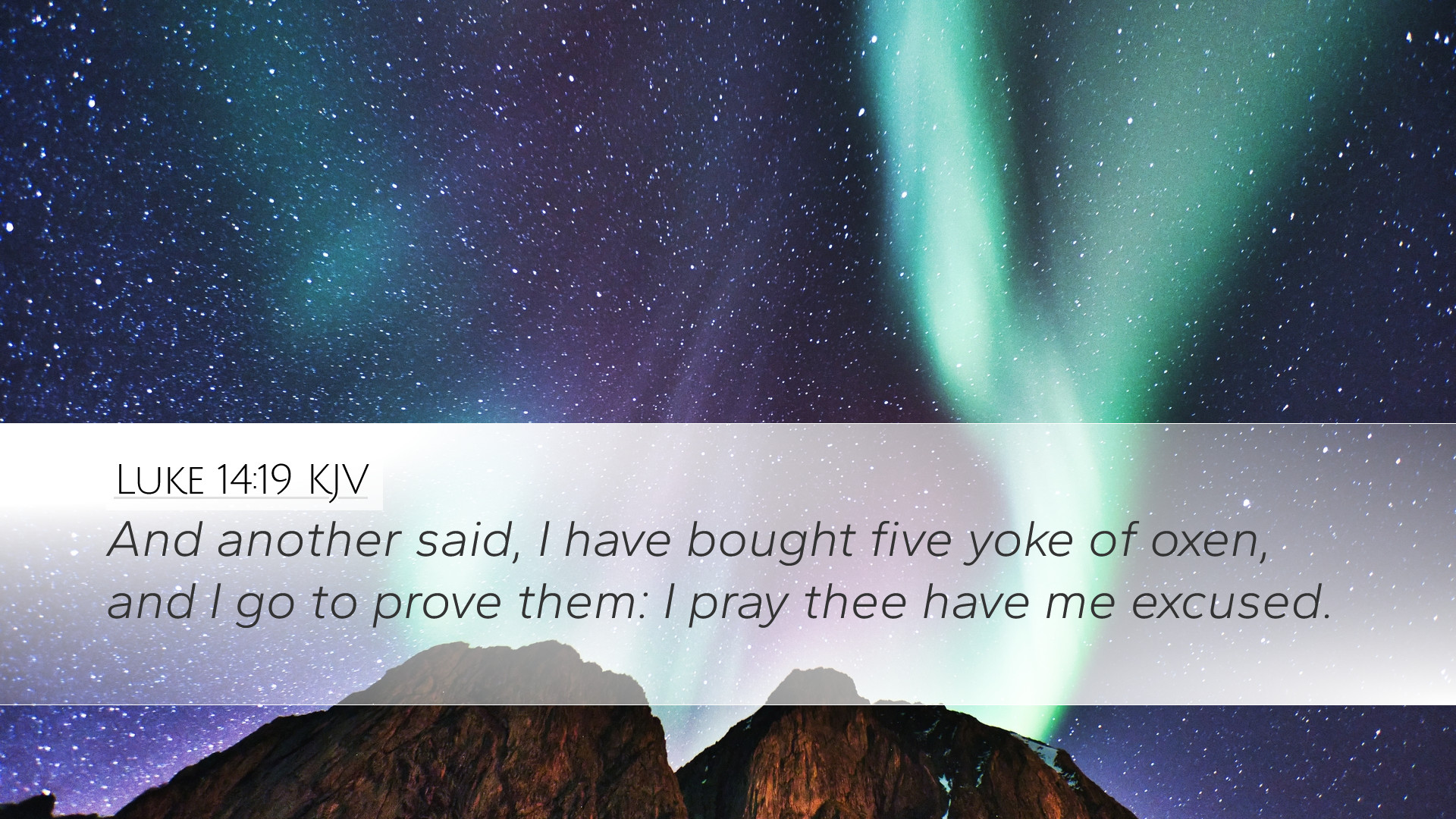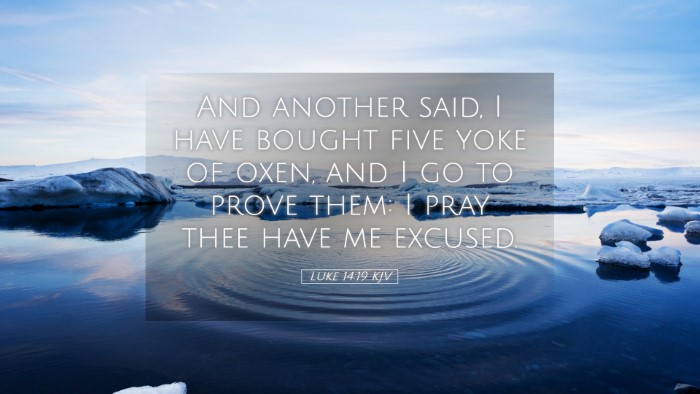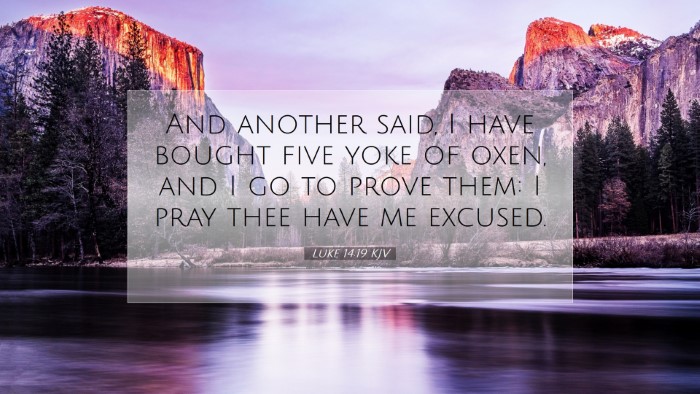Commentary on Luke 14:19
Verse: "And another said, 'I have bought five yoke of oxen, and I go to prove them: I pray thee have me excused.'" (Luke 14:19)
Introduction
This verse is part of the Parable of the Great Banquet, where Jesus illustrates the responses of those invited to a feast. Each excuse provided represents barriers to accepting the invitation to enter the Kingdom of God. By examining this verse through the lens of classic commentaries, pastors, students, and theologians can uncover profound theological insights and practical applications.
Contextual Background
Jesus tells this parable after a meal at the house of a Pharisee, where he observes the behavior of the guests. The banquet symbolizes the Kingdom of Heaven, and the invited guests, who ultimately reject the invitation, signify Israel's rejection of Jesus. This highlights the theme of God's invitation being extended to the marginalized and Gentiles after the rejection by the chosen people.
Insights from Matthew Henry
According to Matthew Henry, the man in this verse signifies those who prioritize worldly affairs over spiritual responsibilities. His claim of having purchased oxen represents material possessions, showcasing the distraction that wealth and obligations can create. Henry argues:
- Worldly Distractions: The man’s focus on his recent purchase illustrates a common temptation: letting earthly pursuits hinder one’s spiritual commitment.
- Excuses Reflect Priorities: The excuse serves as a poignant reminder that many choose temporal benefits over eternal ones, thus illustrating a lack of understanding toward the spiritual banquet offered by Christ.
- Invitation to Reflect: Henry encourages readers to reflect on their own priorities and consider whether they, too, might be making excuses for neglecting their spiritual duties.
Insights from Albert Barnes
Albert Barnes elaborates on the implications of the oxen purchase, emphasizing the nature of the response. He notes:
- Legitimacy of Excuse: The excuse itself appears legitimate; however, Barnes points out that genuine commitments should not prevent one from accepting invitations to spiritual enlightenment.
- Cultural Context: In the cultural context of the time, oxen were vital for labor, and the man’s insistence to “prove them” suggests that he is absorbed in the mundanity of life without recognizing the opportunity presented to him.
- Call to Action: Barnes urges today's believers to be wary of the distractions of life, encouraging an active rejection of any excuse that inhibits spiritual growth and fellowship with God.
Insights from Adam Clarke
Adam Clarke provides additional layers of understanding. He emphasizes:
- Symbolism of the Oxen: Clarke interprets the oxen as representations of labor and duty. This man might have been sincere, yet it points to the reality that even sincere endeavors can distract from God’s calling.
- Spiritual Blindness: The man’s response indicates a form of spiritual blindness. Clarke notes that placing immediate obligations above the invitation of God leads to tragic loss of greater blessings.
- Urgency of the Invitation: Clarke underscores the urgency of accepting the call to the banquet, warning that the longer one delays, the more significant the spiritual loss may become.
Theological Reflections
This verse serves as a cautionary tale reflecting larger theological themes:
- The Danger of Materialism: The invitation symbolizes an eternal reality, and the man’s excuse illustrates how materialism can divert focus from God’s will.
- God’s Grace and Human Response: The parable emphasizes God's grace and the human responsibility to respond positively to God’s call rather than become ensnared by worldly matters.
- Invitation to Worship: The Great Banquet is an invitation to worship and fellowship. Believers are often reminded that worship should take precedence over worldly engagements.
Practical Applications
For pastors and theologians, this verse stimulates important questions and practical applications:
- Self-Examination: Believers are encouraged to examine their lives for distractions that might be hindering their spiritual journey. Are there 'oxen' in our lives demanding our attention?
- Prioritizing Worship: Ministries should cultivate environments where worship is prioritized over mere activity, reflecting the essence of the banquet.
- Encouraging Participation: Leaders must actively encourage congregants to engage with God’s call, avoiding excuses and distractions, reminding them of the transformative power of God’s invitation.
Conclusion
Luke 14:19 is not merely an account of excuses; it represents a deeper theological discourse about human priorities and divine invitations. Through the insights of Matthew Henry, Albert Barnes, and Adam Clarke, we glean that neglecting spiritual invitations for worldly concerns can lead to eternal consequences. As we reflect upon this parable, let us aspire to prioritize God's Kingdom, acknowledging the profound opportunity to partake in the spiritual feast He offers.


